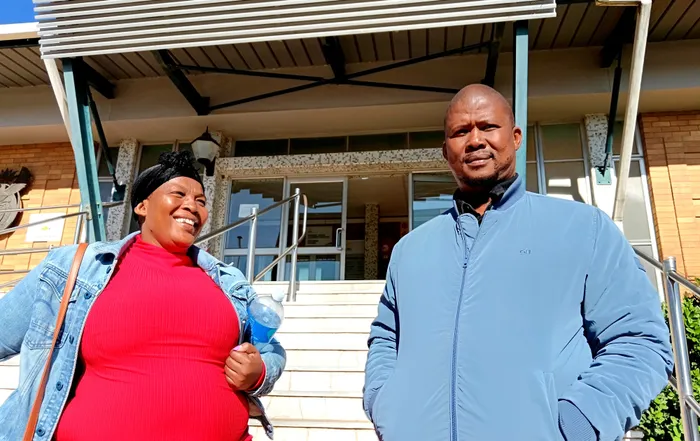Burial rights tussle delays funeral

Keitumetsi Mogapi and Onalenna Kasebidile are relieved that they will be able to bury their loved one close to their home. Picture: Sandi Kwon Hoo
WHILE the bereaved family of Eareng Victoria Sidilang, 55, still do not have closure following her brutal murder, they will be able to bury her this weekend in Batlharos village in Kuruman after they obtained a court order to prevent her spouse from cremating her.
The family argued that the body might need to be exhumed if required for a criminal investigation.
Onalenna Kasebidile said that his sister was shot in the head on September 20, at around 9pm, after returning home from work.
“Her death remains unsolved. No one was arrested for her murder and no autopsy was conducted. She was taken straight to the mortuary after she was killed,” said Kasebidile.
He added that the deceased’s estranged husband, Lapologang Sidilang, had indicated that he wanted to bury her in Maruping village, two days before the funeral was scheduled to take place last week.
Keitumetsi Mogapi added that the family had been estranged from her stepfather (Sidilang) for some time.
“We had no other choice but to approach the court for an urgent interdict as we were unable to resolve the dispute. We live in Batlharos and would not have easy access to my mother’s grave if she was buried in Maruping village. We wanted to bury my mother in a peaceful and dignified manner at her home where she lived,” said Mogapi.
She added that her mother had been living with her brother since 2022, while her stepfather had been residing with his new partner for the past two years.
“My mother advised me that she wanted to obtain maintenance from him before instituting divorce proceedings.”
She claimed that Sidilang was not supporting her mother financially and that he was not entitled to any share of the family home.
“I, however, have no objection to him attending the funeral,” she added.
The family members sought an urgent interdict after they were prevented from performing burial rituals and were concerned that her body would not be released to them for burial.
Sidilang denied that he had been estranged from his late wife.
He added that his wife died without a will and no instructions were stipulated regarding how the funeral should be managed.
He believed that as the surviving spouse, he should have the last say in the event of a dispute regarding the burial rights.
Sidilang stated that a deadlock was reached and “insults, total disrespect and unbecoming conduct” were shown.
He stated that he was a beneficiary of the joint estate as he had contributed financially to building the family home, while they were also married in community of property.
Sidilang explained that he had left the marital home in 2022 due to disagreements with the deceased.
“I have been taking great care of the deceased even though we have been staying in separate houses since 2022. I was in constant communication with her as we were working towards fixing our marriage. Hence none of us ever filed for divorce.”
He added that he had also contributed to the funeral by providing cattle and two sheep.
Sidilang accused Mogapi of orchestrating the removal of the tent from the house where the funeral was supposed to take place.
“I had to make new arrangements for another cattle and sheep to be slaughtered on September 27 at my place, as we were in a state of serious confusion regarding where the funeral was going to be held.”
Delivering judgment on the matter on October 2, Northern Cape High Court Judge Albert Punch Sibongile Nxumalo pointed out that the deceased and her spouse had not managed to reconcile their differences.
“The deceased was brutally shot in the head and the family needs closure. They also need to perform cultural burial rituals and customs,” Judge Nxumalo said.
He stated that while a spouse enjoyed stronger burial rights than the children or parents of the deceased, the deceased should however be buried at the matrimonial home near to her next of kin and not with her distant relatives.
Judge Nxumalo believed that it was unfortunate that the families were unable to amicably resolve the dispute without having to resort to the courts.
He granted the order to restrain Sidilang from arranging the funeral as well as cremating or burying the deceased.
